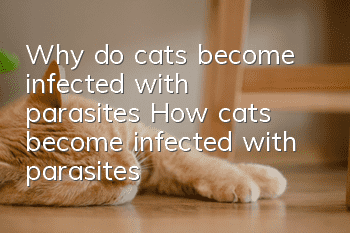Why do cats become infected with parasites? How cats become infected with parasites

Each of our responsible owners will deworm and immunize their cats on time. Parasitic diseases are likely to be infected by every cat. Even cats that live indoors for a long time may be infected by parasites. , many owners can’t help but wonder, in such a clean environment, why do cats become infected with parasites?
1. How cats are infected with parasites
1. Infection through eating raw meat
Cats that eat raw meat are very susceptible to parasites, especially Toxoplasma gondii. Cats become infected by eating the meat of animals infected with the parasite. Many parents like to cut off a piece of meat and throw it to cats begging for food at their feet when cooking, or deliberately feed raw meat to cultivate the wild nature of cats. Feeding raw meat is not a big problem in itself, because raw meat is high in calories and nutritious, and can quickly replenish the cat's physical strength. However, it should be noted that the cat must be dewormed regularly after eating raw meat.
2. Infection through cockroaches
If the home environment is not very hygienic and there are cockroaches in the home, the cat will be at risk of being infected with parasites even if he does not eat raw meat. You know, cockroaches are hosts to many parasites and contain thousands of bacteria and parasite eggs. Cats are curious hunters who like to catch cockroaches, so cats can become infected with parasites when catching cockroaches.
3. Infection through mosquito bites
Summer is the “peak season” for mosquito breeding, and nasty mosquitoes not only spread malaria and other diseases, but also parasites. Heartworms, which can be fatal to cats, are spread through mosquito bites. of. Therefore, special attention should be paid to deworming cats in summer.
4. Transmitted through insect eggs in the soil
Many cat-raising families will grow flowers, and cats are also very interested in plants. However, in addition to some plants that are harmful to cats, the soil where flowers are grown also has hidden harm, because a variety of parasites can kill insects. The eggs are laid in the soil, and when the cat plays in the soil, the parasite eggs will stick to the cat's paws and hair and enter the cat's body through the cat's licking.
5. Spread through the owner’s clothes and shoes
When cat parents come home, the cats will usually greet them affectionately, and by smelling the owner's clothes and shoes, they will know what the owner did in those places today. The clothes and soles of owners often carry "dirty things", especially cat parents who have the habit of feeding stray cats. Clothes and shoes may bring back parasite eggs, and the cats may also be infected with parasitic diseases.
2. What parasites are cats susceptible to?
1. Cat bow shapeFeline toxoplasmosis: Feline toxoplasmosis is a parasitic disease caused by the Toxoplasma protozoa. A variety of animals and people can also be infected with this disease. This disease is widely distributed around the world. The average infection rate in many countries is 25% to 50%, which is extremely harmful to human health. Pregnant women infected with Toxoplasma can cause congenital malformations, defects, diseases or death of the fetus, cause miscarriage, premature birth or increase pregnancy complications. It is an important parasitic disease in medicine.
2. Ascariasis: Ascariasis is a parasitic disease caused by roundworms that affects humans, animals and animals. Clinically, the main features are stunted growth and development in young cats, often manifesting as roundworm pneumonia. It is usually caused by cats, dogs and other animals eating food containing infectious eggs or by sucking colostrum. If the infective eggs are swallowed by animals such as earthworms, cockroaches, birds, mice and other animals, the larvae will form cysts in the tissues and will not develop. Cats will be infected by eating the transferred host. Dogs, cats and other animals are loose and defecate everywhere. When the environment is suitable, the eggs will develop into infectious eggs, which can easily infect healthy dogs and cats. This disease can cause death of cats.
3. Alveolar worm disease: Alveolar nematode is a parasitic disease of dogs and cats caused by Alveolar nematode. The main clinical features are vomiting and tarry stool. Parasitic in the intestines. Host animals include dogs, cats, pigs and other carnivores. The intermediate hosts are mainly arthropods such as cockroaches, crickets and beetles. It is unclear whether there is a second intermediate host. Cats, dogs and other animals are mainly infected through mouth.
4. Pulmonary capillariasis: Pulmonary capillariasis is a parasitic disease of dogs and cats caused by pulmonary capillaries. Clinically, respiratory diseases are the main cause. Parasitic on the bronchi and trachea of dogs and cats.
5. Hookworm disease: Hookworm disease is more serious to cats. Generally speaking, there are four kinds of hookworms that are infective to cats. The more common ones are cat hookworm and canine hookworm infection. Infection routes include: oral infection and consumption of infective larvae or intermediate vectors such as mice. Transdermal infection Infectious larvae can invade the body directly through intact skin and pores. Transplacental hookworm infection migrates from the mother cat to infect the kittens in the uterus, or the kittens are infected by eating contaminated breast milk after birth.
6. Tapeworms: Tapeworms are a very common internal parasite in cats. The body of the insect is band-shaped and consists of a head segment, a neck and many body segments. Some species have only one body segment, while others have dozens, hundreds or even more. Tapeworms live a parasitic life, and their adult worms generally live in the intestines of various animals, but rarely in the stomach, liver, bile ducts and body cavities.
With so many and complex parasites, in fact, you can basically get rid of them all with just a simple anthelmintic medicine. Therefore, even if the cat is infected with parasites, the owner should not panic. As long as the cat is dewormed on time, it will generally not be affected. What's the big deal.
- How to choose a Sphynx cat
- Why do cats scratch the sofa?
- How to train a docile cat? Cat behavior training!
- What to do if a cat has diarrhea? Let’s briefly talk about the things that can stop cats from having diarrhea!
- What is the personality of American Shorthair cats?
- Are Siamese cats easy to raise? Siamese cat personality
- How to keep cats off sofas and beds?
- Why does Garfield always cry?
- What are the symptoms if a kitten accidentally eats cat litter?
- The function and care of cat claws



